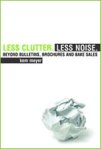 It has been a long time since I have read a book in an afternoon, but today I did just that. Just the title of Kem Meyer’s book, Less Clutter. Less Noise. Beyond Bulletins, Brochures and Bake Sales, immediately caught my attention. Maybe it’s because I’ve spent the last six months or so thinking about communications with some of my colleagues at Southside Fellowship. Or maybe it’s because I’m into the whole less clutter, less noise idea. Either way, I’m not disappointed I picked up this book.
It has been a long time since I have read a book in an afternoon, but today I did just that. Just the title of Kem Meyer’s book, Less Clutter. Less Noise. Beyond Bulletins, Brochures and Bake Sales, immediately caught my attention. Maybe it’s because I’ve spent the last six months or so thinking about communications with some of my colleagues at Southside Fellowship. Or maybe it’s because I’m into the whole less clutter, less noise idea. Either way, I’m not disappointed I picked up this book.
One of my favorite sections is called Testing Assumptions. We talk about this a lot among our staff and have frequently asked one another if we are “running up the ladder of inference.” Kem shares something she read in a magazine–
The human eye has a blind spot in its field of vision. The human mind has something similar. Sometimes you can’t “see” new information because you are bound by filters and lack the mental framework to make sense of what your eyes take in. People often see what they want to see and ignore information that doesn’t fit their preconceptions. We default to the shortcut of seeing things the same way. People seek stability and security, so seeing things in a way that confirms their beliefs gives them both.
She goes on to say–
It is our responsibility to acknowledge that nine times out of ten, there is more to the story. Before we leap to conclusions–about a person, a method, a decision, a program–we should learn about it. When we are deliberate about doing our homework, it is amazing the new wisdom, impact and connection that opens up to us.
Lately I’ve been doing a lot of observation and evaluation…watching how people work, how they communicate and why some systems are not working as well as they once did. It’s really interesting when you ask questions and hear different viewpoints about the same subject. I’ve had to chuckle a few times. Things are rarely as they appear on the surface. Some things I’ve been reminded of…
- Most people are really just trying to do the best they can with what they have.
- There is always more than one way to look at things.
- We all have a story and most of us are dealing with at least one major stress in our lives.
It’s so easy to believe my perception is reality. So easy to jump to conclusions. So easy to make assumptions. I’m reminding myself of something I’ve learned recently…make assumptions, just be sure they are charitable assumptions. Because, like Kem said, there is usually more to the story.
 Having read several of Marcus Buckingham’s books in the past, I was especially excited when I saw that he had written one for women. I am married and have been a stay-at-home mom, a part-time working mom, a successful home-based business mom and a full-time working mom. Find Your Strongest Life is definitely a book for women, but to me it seems more directed to the working mom.
Having read several of Marcus Buckingham’s books in the past, I was especially excited when I saw that he had written one for women. I am married and have been a stay-at-home mom, a part-time working mom, a successful home-based business mom and a full-time working mom. Find Your Strongest Life is definitely a book for women, but to me it seems more directed to the working mom.